Sarah Jeong, a 30-year-old journalist who’s just been hired by the New York Times, was trending on social media yesterday. The reason, predictably enough, is that she wrote a series of ill-judged tweets several years ago. Jeong is an Asian-American and, four years ago, expressed a number of racist sentiments about white people, whom she compared to ‘dogs’ and ‘groveling goblins’. ‘Oh man it’s kind of sick how much joy I get from being cruel to old white men,’ she wrote in 2014.
The New York Times issued a statement yesterday defending their new hire and claiming that Jeong’s status as a person of colour went some way to excuse her apparently racist tweets. “Her journalism and the fact that she is a young Asian woman have made her a subject of frequent online harassment,” The Times said. “For a period of time she responded to that harassment by imitating the rhetoric of her harassers. She sees now that this approach only served to feed the vitriol that we too often see on social media.”
Not surprisingly, that defense has been widely ridiculed. For instance, the National Review’s David French pointed out that the Times would be unlikely to extend the same charity to the white victim of a black criminal who expressed racist sentiments as a result of that trauma. The Times is on a sticky wicket because last year it experienced a similar backlash when it hired Quinn Norton, a less politically correct journalist than Jeong. However, when various ‘offensive’ things she had said on Twitter came to light, the Times immediately terminated her contract. The only difference between the two cases is that the people calling for Norton’s head were left-wing hashtag activists, whereas the people demanding Jeong be fired are, for the most part, conservatives.
I’ve written in the Spectator this week about whether conservatives should use the social media shaming tactics of the left against their opponents. Last month, alt-right activists succeeded in getting the Hollywood liberal James Gunn fired by Disney as the director of Guardians of the Galaxy Vol 3 after drawing attention to some terrible jokes he’d made on Twitter in 2008 and 2009 about rape and pedophilia. This was in spite of the fact that he’d directed the first two Guardians of the Galaxy films, both of which were commercial behemoths.
Many people on my side of the political divide chalked this up as a great victory. Not only is it poetic justice because Gunn tried to whip up an outrage mob against another director last year, accusing him of being a sexual predator, but if conservatives turn the tables on social justice warriors and start publicly shaming them for inappropriate things they’ve said on social media they’ll be less likely to come after people like me in future. Even if it doesn’t have that effect, it would be wrong to ignore this weakness. As one conservative colleague told me, refusing to use this political weapon against our opponents would be an act of ‘unilateral disarmament’. Given that we’re locked in mortal combat in an ongoing culture war, that would be irresponsible. ‘You can’t take a knife to a gunfight,’ he said.
As someone who’s been through this mill, I disagree. I was publicly shamed at the beginning of the year for various asinine things I’d said on Twitter and, as a result, had to stand down from three charitable boards and give up my full-time job. As you’d expect, I don’t think people should be denuded of their livelihoods on the basis of a few ill-judged tweets, as if those are the moments when the mask of decency has slipped and the monster within is revealed. Rather, you should assess a person by looking at all their behaviour over the course of their lifetime – their actions as well as their words. And that’s a rule that should apply to everyone, regardless of their political leanings and regardless of whether they’ve followed that rule themselves. Of course, it’s unrealistic to expect people to be scrupulously fair-minded when judging others, particularly their political enemies. But it seems reasonable to expect Disney to observe due process before firing somebody, rather than immediately caving in to the mob.
More importantly, if conservatives start shaming social justice warriors for breaching politically correct speech codes we are tacitly legitimising those codes. In effect, we’re accepting that anyone who is guilty of making an inappropriate joke on social media, or who says something ‘offensive’ about a member of a racial group, as Sarah Jeong did, is beyond the pale and deserves to be publicly humiliated, up to and including losing their job. I’m not talking about drawing attention to the hypocrisy of our opponents, which is fine, obviously – and the New York Times certainly seems guilty of that. The problem starts when that accusation morphs into something more closely resembling the confected moral outrage of the digital thought police. As defenders of free speech, we should be upholding the principle that no viewpoint, whether satirical or serious, is out of bounds. If you disagree with somebody, the correct response is to engage them in open debate, not whip up a mob to shame them into silence.
There’s one other consideration which is that we don’t need to teach the left this lesson in tolerance when it comes to public discourse. They have already started to use their own tactics against each other, such as the recent shaming of a left-wing poet for writing some ‘ableist’ verse in a left-of-centre political weekly. Standing to one side is not ‘unilateral disarmament’ when your enemies have formed a circular firing squad.







Comments